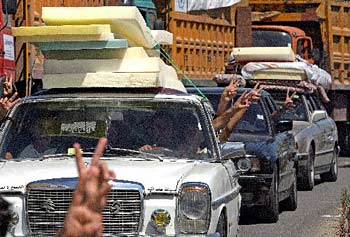
Displaced Lebanese flash V-signs as they drive back with
their belongings to the southern suburb of Beirut yesterday.
-Xinhua/Reuters
Thousands of Lebanese civilians yesterday stream onto roads and headed back
toward their homes in the south after a UN-brokered ceasefire between Israel and
Hezbollah appeared to take hold.
Residents of the port city of Tyre ventured out of shelters as soon as calm
prevailed after the UN ceasefire deal entered into force at 0500 GMT, AFP
reported.
The residents headed to inspect homes and stock up on bread and other
provisions, an AFP correspondent on the scene said.
Cars and pick-ups, loaded with families and luggage, were seen streaming from
Tyre on mountain roads leading to villages in the area.
Similar convoys arrived to Tyre from the north, as residents who had fled to
the coastal city of Sidon started to head back home.
Lines of cars -- some loaded with mattresses and luggage -- snaked slowly
around bomb craters and blasted bridges as people tried to reach southern
Lebanon for their first view of what is left of their homes and property.
Witnesses said refugees, young and old, cheered and talking of "victory
against Israel." Some carried pictures of Hizbollah leader Sayyed Hassan
Nasrallah. Others handed out leaflets hailing the Shi'ite group's "divine
victory" over Jewish state.
The Lebanese Army was trying to coordinate efforts to fill the craters in the
roads and give cars more room to move.
The rush to return and rebuild came despite the fragility of the cease-fire.
The Israeli army said it was keeping its ban on "unauthorised" traffic in south
Lebanon to prevent movement of Hizbollah gunmen.
Some 30,000 Israeli forces still remained in Lebanon. The next step --
sending in a peacekeeping mission -- still appeared days away.
A Lebanese cabinet minister told Europe-1 radio in France that Lebanese
soldiers could move into the southern part of the country as early as Wednesday.
"The Lebanese army is readying itself along the Litani to cross the river in
48 to 72 hours," said Lebanon's communications minister, Marwan Hamade.
The UN plan calls for a 30,000-member, joint Lebanese-international force to
move south of the Litani River, about 18 miles from the Israeli border, and
stand as a buffer between Israel and Hezbollah militia.



